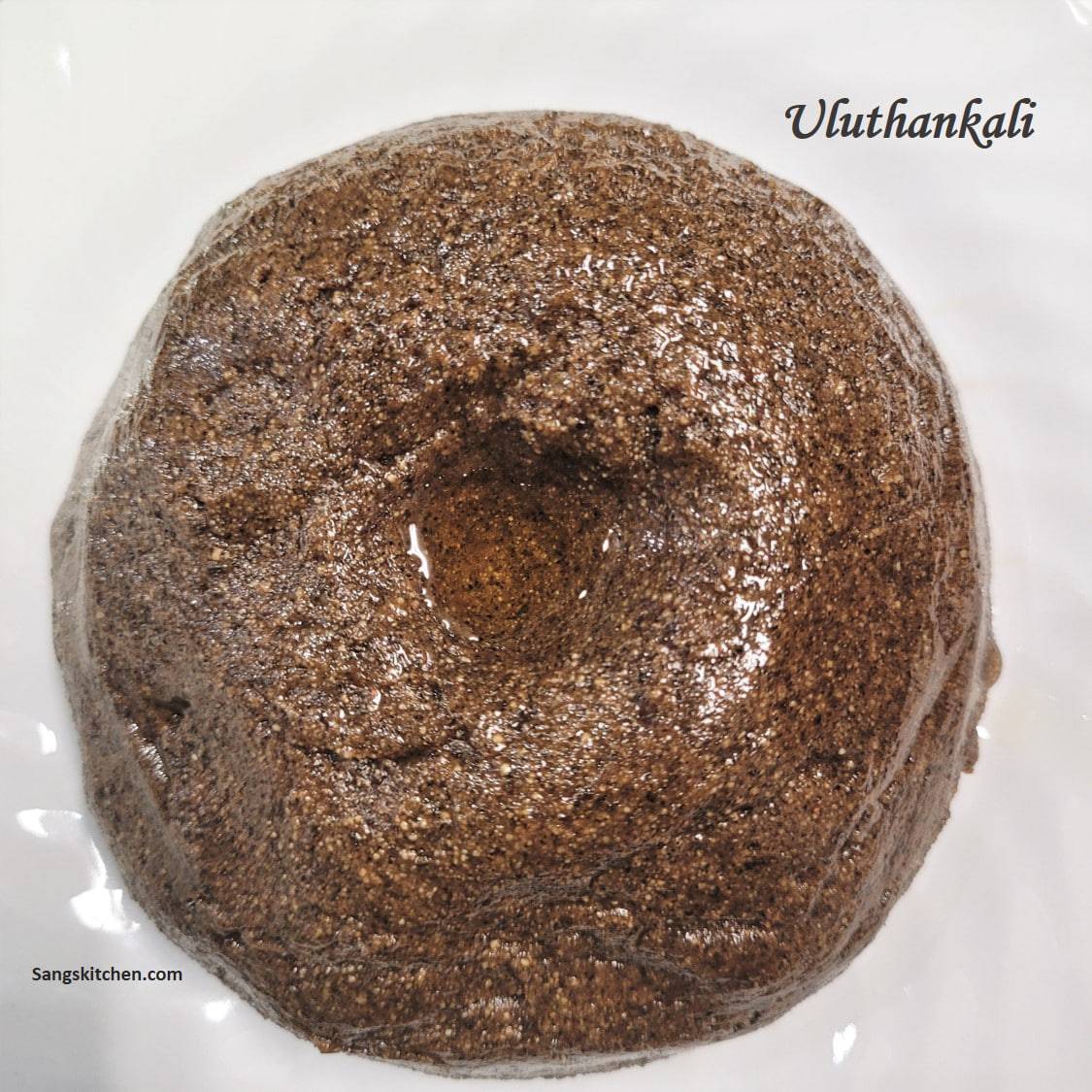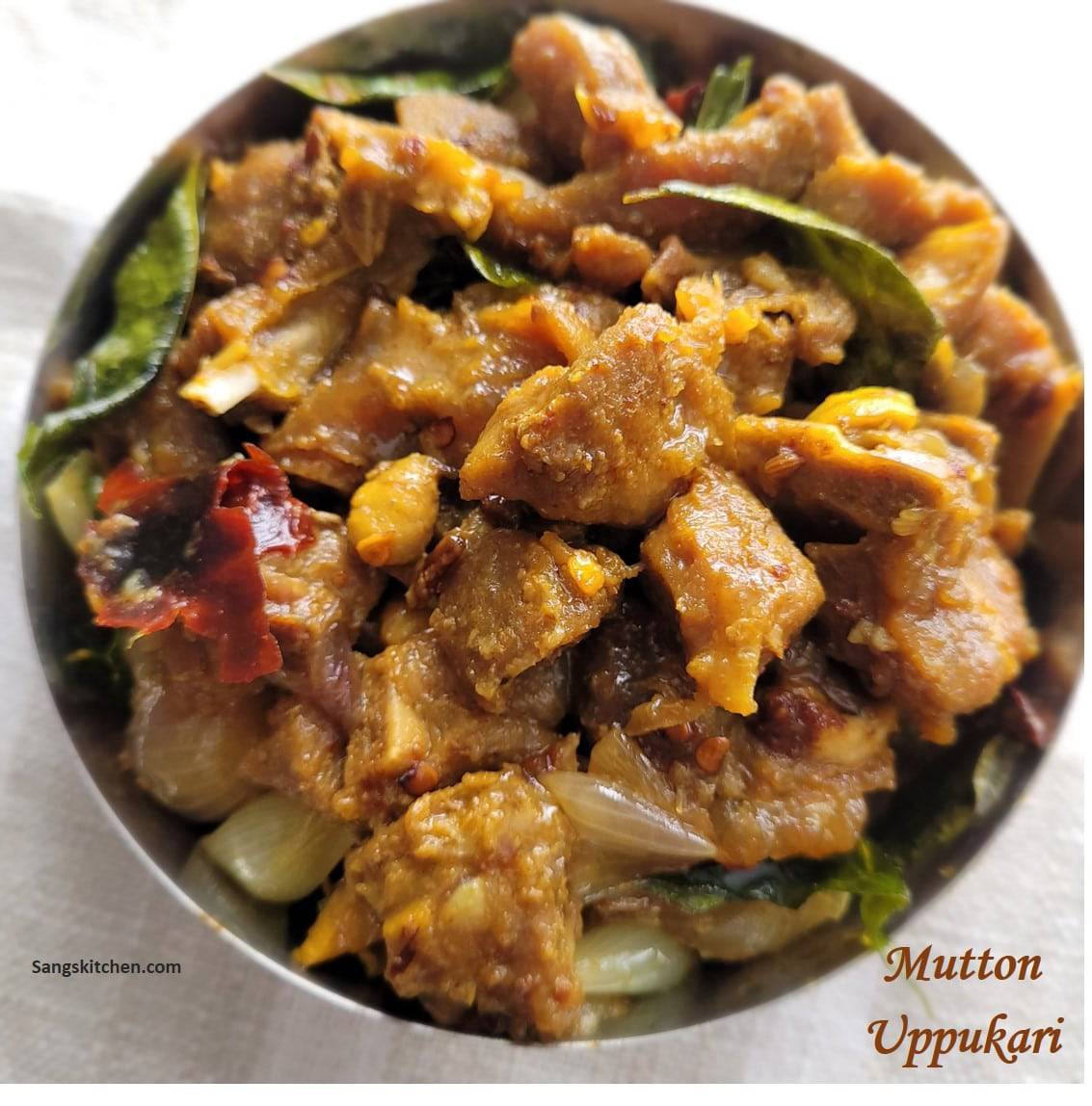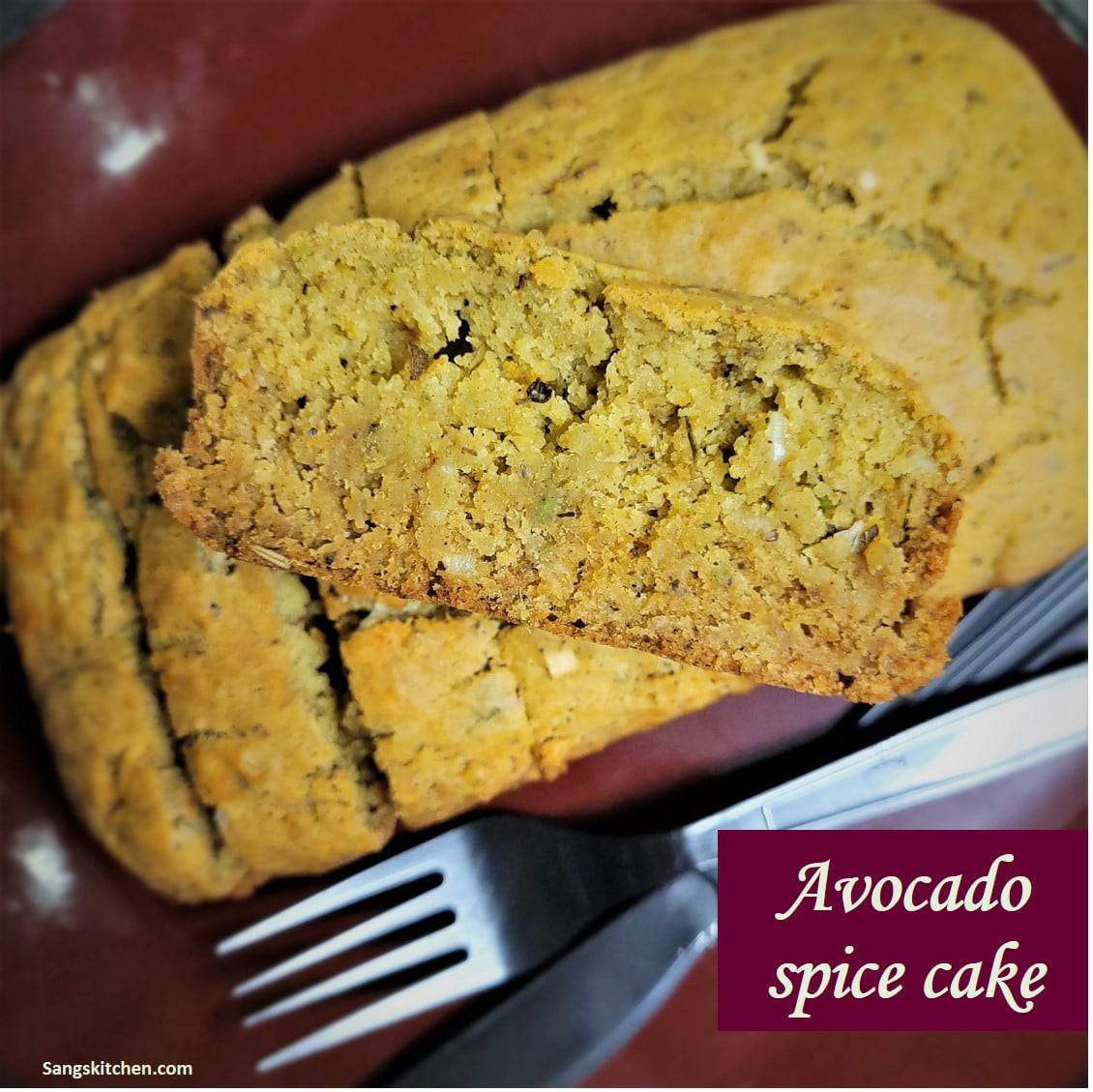Uluthankali is a traditional sweet made with whole black urad dal(black gram), raw rice, gingelly oil and palm jaggery.
Ulundhu kali is a highly popular food made for girls attaining puberty. Healthy food with enough nutrients is important at this stage for teenagers. Though this is a special food made for girls to strengthen their hip bones, the abundant protein from urad and other benefits from palm jaggery & gingelly oil make ulunthu kali a perfect food for everyone.
Why ulutham kali is healthy:
Black gram – First, I highly recommend you to always use black whole urad dal for making this kali. Black gram has high fiber, which promotes gut health. A good amount of iron in black gram improves energy levels and prevents anemia. The other vital minerals such as calcium, magnesium and potassium in black urad help to keep our bone mineral density in a good state thus preventing osteoporosis and arthritis. Moreover, this dal is good for diabetes, heart ailments & skincare.
info source: https://www.organicfacts.net/health-benefits/other/black-gram.html
Sesame oil – Gingelly oil as you all know is one of the healthiest oils used for cooking. Sesame oil is good for joint problems, tooth pain, skin & hair health. Moreover, gingelly oil also contains omega-3 and omega-6 fatty acids, both of which are polyunsaturated fats. Both are essential fatty acids that help prevent several diseases, including heart disease and cancer. They also help improve immune function.
Palm jaggery – Palm jaggery is packed with nutrients like iron, folate, potassium and calcium. It acts as a detox, flushing out the toxins from our bodies. Palm jaggery helps to maintain body heat thus acting as a remedy for cold and cough. Palm jaggery has a lower glycemic index and less sweet than sugar can jaggery hence best to use in uluthankali.
Uluthankali | Karupatti Ulundu kali
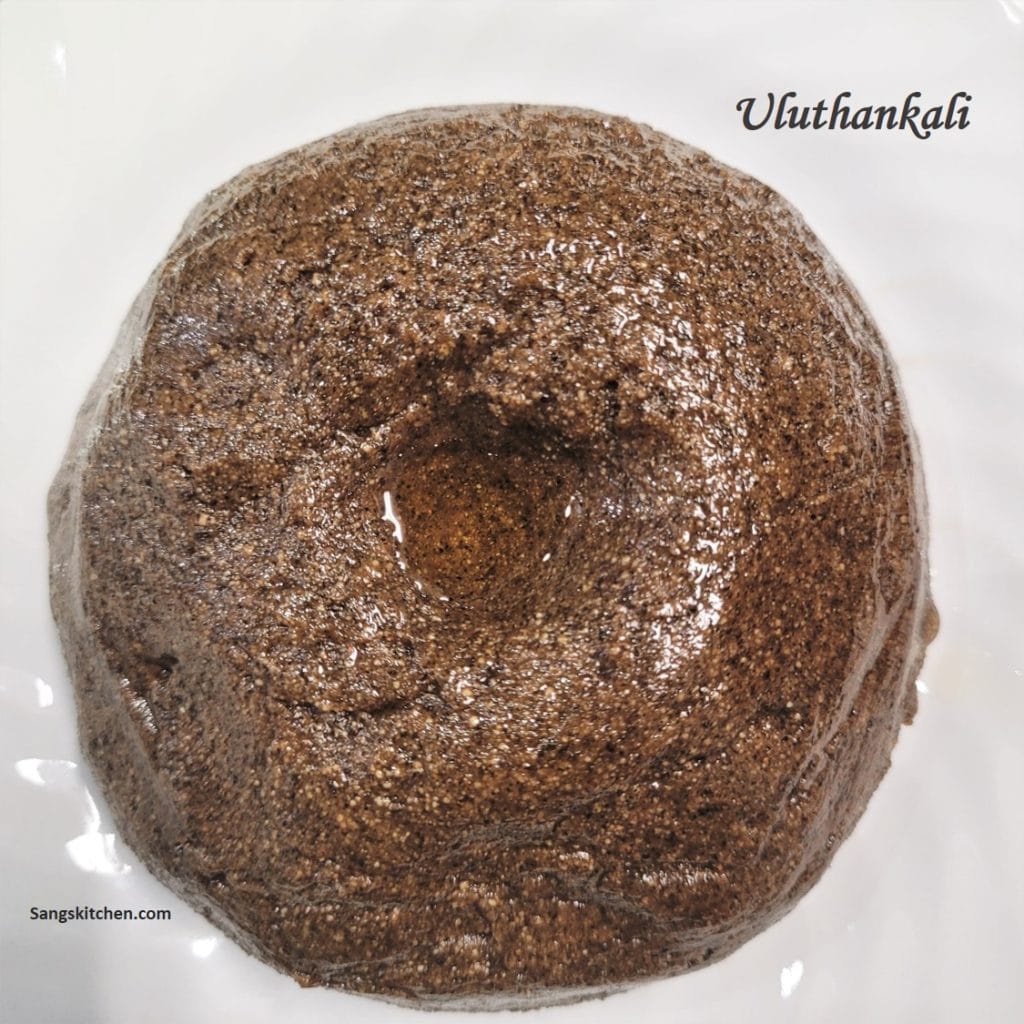
Ingredients:
Whole urad – Whole urad with skin is the right choice for making kali. One cup of roasted urad-rice flour can serve uluthankali for two people.
Raw rice – For 1 cup of urad dal, use a quarter cup of raw rice. Rice helps ulundhu kali to get a nice texture.
Palm jaggery – Palm jaggery (karupatti) is the sweet used to make this traditional karupu ulundu kali. But if you don’t get this replace it with normal jaggery. As sugarcane jaggery is much sweeter than palm jaggery, use reduced quantities from the mentioned quantity in the recipe.
Cardamom powder – A tsp of green cardamom powder gives an enhanced sweet aroma to the black urad kali.
Sesame oil – Sesame alias gingelly oil is the fat served with this sweet urad kali. Ghee can be used as an alternate but I highly recommend cold-pressed gingelly oil for the health benefits.
Recipe for uluthankali:
- Measure the ingredients and keep them ready.
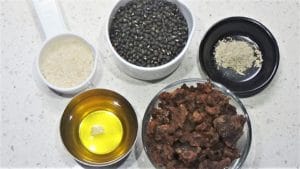
- First dry roast 1 cup of black whole urad dal in a pan. Roast at medium heat for a few minutes. Be watchful as the urad is in dark color we cannot go by color for its doneness. Go by smell for burning. Transfer the roasted urad to a plate when you get the nice roasted aroma.
- On the same pan roast a quarter cup of raw rice for 3 to 4mins until crisp.
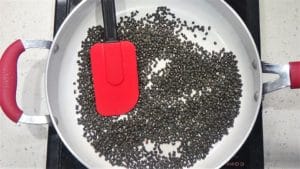
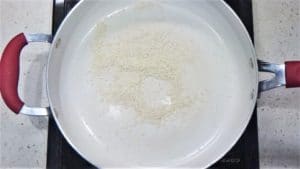
- Let the roasted ulundhu and rice cool down sometime and grind them together into a smooth powder. After the first round, sieve the ground powder to separate fine flour from coarse grits.
- Put the grits back in the blender again and grind into a fine powder. Uluthankali will be soft only when the flour is super fine.
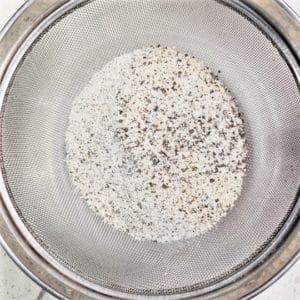
- Next, take a cup of palm jaggery in the pan with a cup of water. Add a tsp of cardamom powder and mix.
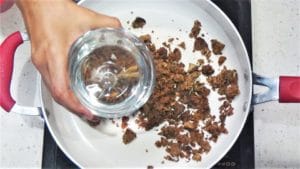
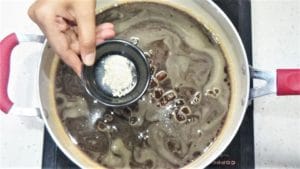
- Let the jaggery dissolve and melt completely. No need to cook the syrup further. Filter the jaggery water to remove the dirt and keep it aside.
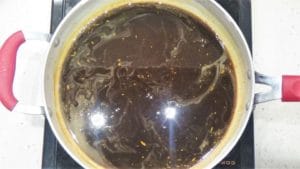
Making Ulundankali without lumps:
- Add the urad-rice flour back to the pan and slowly add the jaggery water and mix well. If you are a beginner and worried about lumping, first mix the jaggery water with the urad powder fully to make a paste before switching on the stove.
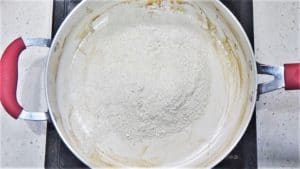
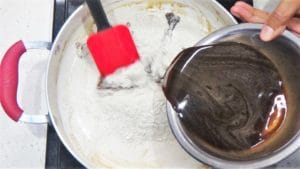
- Mix well, stir without break, and cook at low heat. Soon the flour absorbs all the liquid and starts thickening.
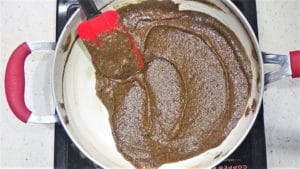
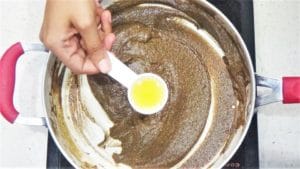
- Keep stirring constantly at medium heat to avoid burning.
- In around ten minutes, the kali firms up and comes together.
- When the uluthankali gathers as a mass add two tbsp of gingelly oil and mix well.
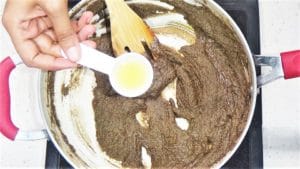
- Wet your fingers and touch the kali to check the finished stage. If it is not sticky on the fingers and if you can roll a ball out of it, then the ulundu kali is ready.
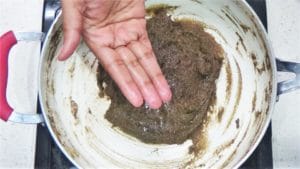
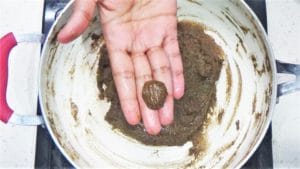
- Switch off, shape up and serve uluthankali with gingelly oil.
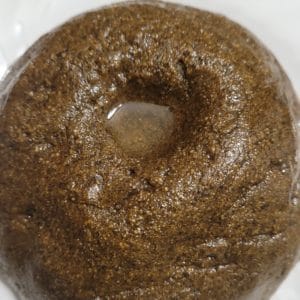
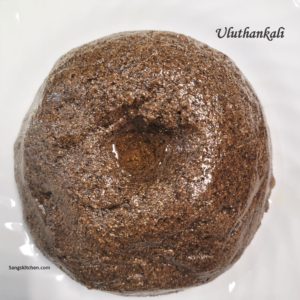
Uluthankali | Karuppatti ulundu kali | Ulutham kali with palm jaggery
Equipment
- Heavy bottom pan
Ingredients
- 1 cup Whole urad dal Black
- ¼ cup Raw rice
- ¼ cup Gingelly oil
- 1 cup Palm jaggery karuppatti
- 1 tsp Cardamom powder
- 1 cup water approx.
Instructions
Recipe for uluthankali:
- Measure the ingredients and keep them ready.
- First dry roast 1 cup of black whole urad dal in a pan. Roast at medium heat for a few minutes. Be watchful as the urad is in dark color we cannot go by color for it's doneness. Go by smell for burning. Transfer the roasted urad to a plate when you get nice roasted aroma.
- On the same pan roast quarter cup of raw rice for 3 to 4mins until crisp.
- Let the roasted ulundhu and rice cool down some time and grind them together into a smooth powder. After the first round, sieve the ground powder to separate fine flour from coarse grits.
- Put the grits back in the blender again and grind into a fine powder. Uluthankali will be soft only when the flour is super fine.
- Next take a cup of palm jaggery in the pan with a cup of water. Add a tsp of cardamom powder and mix.
- Let the jaggery dissolve and melt completely. No need to cook the syrup further. Filter the jaggery water to remove the dirt and keep aside.
How to make uludhu kali without lumps:
- Add the urad-rice flour back to the pan and slowly add the jaggery water and mix well. If you are a beginner and worried about lumping, first mix the jaggery water with the urad powder fully to make a paste before switching on the stove.
- Mix well, stir without break, and cook at low heat. Soon the flour absorbs all the liquid and starts thickening.
- Keep stirring constantly at medium heat to avoid burning.
- In around ten minutes the kali firms together, add a tbsp of gingelly oil and mix with the kali.
- When the uluthankali gathers as a mass add one more tbsp of gingelly oil.
- Wet your fingers and touch the kali to check the finished stage. If it is not sticky on the fingers and if you can roll a ball out of it, then the ulundu kali is ready.
- Switch off, shape up and serve uluthankali with gingelly oil.
Video
Notes
1) Rice helps maintaining the texture of the kali so don't avoid it.
2) If you are using normal sugar cane jaggery use reduced quantities as it is sweeter than palm jaggery.
